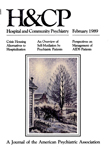Warning Third Parties at Risk of AIDS: APA's Policy Is a Reasonable Approach
Abstract
The author argues that the American Psychiatric Association's AIDS policy on confidentiality and disclosure provides reasonable guidelines for psychiatrists struggling to balance their obligation to maintain the confidentiality of individual patients infected with human immunodeficiency virus (HIV) with their obligation to protect the community's health. The policy states that notification of third parties who may be exposed to infection through the behavior of an HIV-positive patient is ethically permissible if the psychiatrist has exhausted efforts to work with the patient to terminate behavior that places others at risk and if the patient understands the limits of confidentiality. The author points out that judicious notification is within the medical tradition that includes disclosure of a patient's dangerousness in situations involving infectious diseases such as tuberculosis and is supported by the duty-to-warn precedent set by the Tarasoff decision.
Access content
To read the fulltext, please use one of the options below to sign in or purchase access.- Personal login
- Institutional Login
- Sign in via OpenAthens
- Register for access
-
Please login/register if you wish to pair your device and check access availability.
Not a subscriber?
PsychiatryOnline subscription options offer access to the DSM-5 library, books, journals, CME, and patient resources. This all-in-one virtual library provides psychiatrists and mental health professionals with key resources for diagnosis, treatment, research, and professional development.
Need more help? PsychiatryOnline Customer Service may be reached by emailing [email protected] or by calling 800-368-5777 (in the U.S.) or 703-907-7322 (outside the U.S.).



